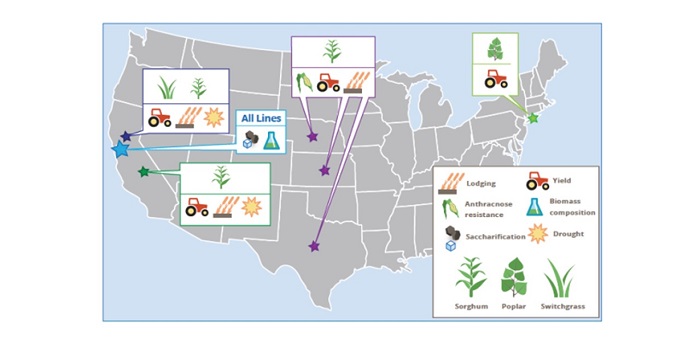The field-testing led by the Agronomic Systems Optimization team allows us to better understand how engineered traits impact lodging, pathogen resistance, drought tolerance, composition, and yield; select optimal varieties for introduction of engineered traits; and assess crop performance and processing efficiency when grown in different locations and soil types. By partnering with the Deconstruction Division, we are also able to determine how engineered crops grown under different conditions will impact downstream sugar and lignin intermediate yields, thus elucidating the linkages between genotype, phenotype, and product yields. The team’s focus is on bioenergy sorghum. These activities are being conducted through a close collaboration between LEAD, the Feedstocks Division, and Deconstruction Division, and span locations across the US, including CA, TX, KS, NE, and NY, representing different soil types and climates.
Projects
- Cultivate sorghum test plots of engineered and wild-type lines, collect initial phenotypic data, including lodging and pest susceptibility
- Review and plant sorghum line phenotypes and identify sorghum ideotype(s) for bioenergy and bioproduct production
- Plant lines to explore natural sorghum variation, and JBEI lines under three irrigation regimes, full ET water, pre-flowering, and post-flowering drought stress and storage methods to be explored.
- Examine agronomic effects (e.g. harvest timing, irrigation, leaf/stem) on quality and yield parameters
Featured Publications
- “Moisture and salt tolerance of a forage and grain sorghum hybrid during germination and establishment”, J. of Crop Improvement (2016).
- “Multivariate calibration models for sorghum composition using near-infrared spectroscopy”, Tech. Report NREL/TP-5100-56838 (2013).
- “Variation in biomass composition components among forage, biomass, sorghum-sudangrass, and sweet sorghum types”, Crop Sci (2012).
- “Properties of field-sprouted sorghum and its performance in ethanol production”, J Cereal Science (2010).
- “Compositional and agronomic evaluation of sorghum biomass as a potential feedstock for renewable fuels”, J. Biobased Materials & Bioenergy (2011).
